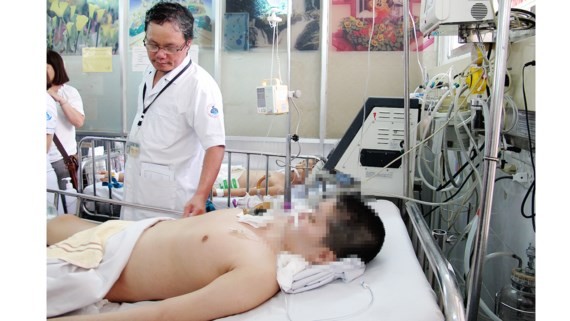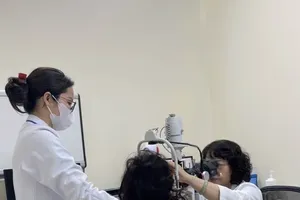
The disease usually attacks kids from five to fifteen. In the South, it often occurs in the Mekong delta region.
Head of Ho Chi Minh -based Children Hospital’s Infectious Ward Dr. Truong Huu Khanh said that since the beginning of the year, the ward has admitted 24 cases of Japanese encephalitis accounting for 50 percent of total cases of meningitis and encephalitis .
At this time, the ward is treating six child patients who are in critical condition and they had to put on ventilators. Sometimes the ward has no bed because so many kids are admitted and therefore, they are transferred to stay in intensive care unit, said Dr. Khanh.
Medical workers warned Japanese encephalitis is considered one of dangerous illness with high rate of mortality and complication ranging from 25 percent to 35 percent.
Head of Ho Chi Minh -based Children Hospital’s Infectious Ward Dr. Truong Huu Khanh said that since the beginning of the year, the ward has admitted 24 cases of Japanese encephalitis accounting for 50 percent of total cases of meningitis and encephalitis .
At this time, the ward is treating six child patients who are in critical condition and they had to put on ventilators. Sometimes the ward has no bed because so many kids are admitted and therefore, they are transferred to stay in intensive care unit, said Dr. Khanh.
Medical workers warned Japanese encephalitis is considered one of dangerous illness with high rate of mortality and complication ranging from 25 percent to 35 percent.
Complications reduce patients communication ability or labor capability becoming a burden for the families and the society. The disease is an infection of the brain caused by the mosquito-borne Japanese encephalitis virus.
The disease usually occurs in rural districts especially in rice paddy field. The primary vector of Japanese encephalitis is mosquito which carries virus from pigs and bird into human.
The disease usually occurs in rural districts especially in rice paddy field. The primary vector of Japanese encephalitis is mosquito which carries virus from pigs and bird into human.
The disease occurs year-round and it usually peaks between May and September.
Dr. Truong Huu Khanh advised parents to take their kids to infirmaries for vaccination because vaccination is an effective way against encephalitis. Over recent years, encephalitis vaccine is included in the National Expanded Immunization; accordingly, there has been a significant decrease in kids under five years old
After eight month taking care of her kid at the Children Hospital No.1, Ms. Tran Thi Yen Nga hailing from the Mekong delta province regretted because she had not taken her kid to an infirmary for vaccination.
Dr. Truong Huu Khanh advised parents to take their kids to infirmaries for vaccination because vaccination is an effective way against encephalitis. Over recent years, encephalitis vaccine is included in the National Expanded Immunization; accordingly, there has been a significant decrease in kids under five years old
After eight month taking care of her kid at the Children Hospital No.1, Ms. Tran Thi Yen Nga hailing from the Mekong delta province regretted because she had not taken her kid to an infirmary for vaccination.
In October 2016, her kid experienced fever though she gave the kid drugs in three days. She rushed the kid to the local hospital where transferred the kid the Children Hospital No. 1 in Ho Chi Minh City. From now on, her kid Thai Van Que has been on ventilator.
Statistically, 60 percent of encephalitis children will recover while 30 percent will suffer complications and 10 percent of them may die.
Dr. Khanh said an encephalitis patient must stay in medical clinic for many days even many months. Worse, the disease can leave serious complications such as living on ventilator which can develop ventilator-associated pneumonia and death or the disease will leave patients a vegetable existence, mental retardation weak climbs.
At present, there has been no specific medication for Japanese encephalitis or treatment. Patients are on ventilators and take drug against convulsion fits; therefore, doctors can reduce death not complications.
Statistically, 60 percent of encephalitis children will recover while 30 percent will suffer complications and 10 percent of them may die.
Dr. Khanh said an encephalitis patient must stay in medical clinic for many days even many months. Worse, the disease can leave serious complications such as living on ventilator which can develop ventilator-associated pneumonia and death or the disease will leave patients a vegetable existence, mental retardation weak climbs.
At present, there has been no specific medication for Japanese encephalitis or treatment. Patients are on ventilators and take drug against convulsion fits; therefore, doctors can reduce death not complications.
Vaccination and killing mosquito are two effective ways to prevent the disease. It needs to have at least three shoots of encephalitis vaccine as per scheduled and every three years, parents must take kids to hospital for a shoot.
























